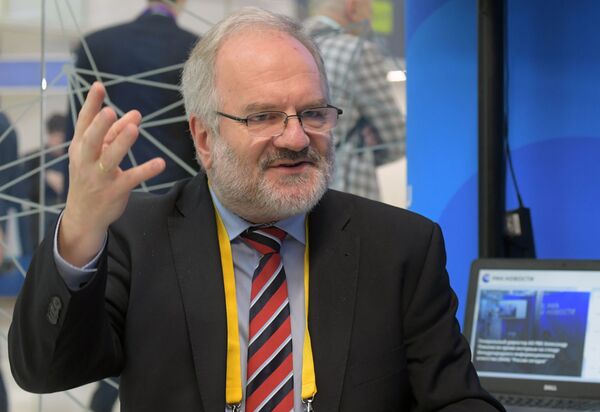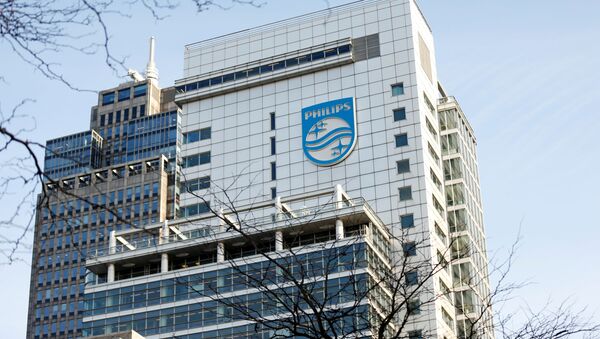Head of the Data Science and AI Centre of Expertise at Philips, Hans-Aloys Wischmann, has attended the forum and shared his insights into the applications of artificial intelligence systems at the company.
Sputnik: According to the Forrester data, at the moment only 12% of companies are using AI systems for their operations and Philips is among them. What processes have already been automated with AI at Philips?
Hans-Aloys Wischmann: To clarify a bit, we are not replacing processes or automating away people’s work, but we are leveraging AI to detect patterns in our own data to augment the ability of the people in the finance sector, in logistics, supply chain, to track any goods and events out of patterns that we are seeing, and to try to predict more accurately what could happen next. So, it is traditional data science, traditional looking back into the mirror and trying to understand what is happening, to create predictive models both in the healthcare space for the outside world and for our own operations.

Sputnik: And what processes are planned to be automated in the near future?
Hans-Aloys Wischmann: The same areas that I was referencing to: see how our finance flow is working; logistics, supply chain. And there are discussions on how to use AI and blockchain technologies to secure some of those elements and to create immutable ledgers.
Sputnik: What obstacles has Philips already struggled with while implementing AI solutions (if any)?
Hans-Aloys Wischmann: Perhaps, less of an obstacle and more of a journey in the sense that initially it was traditional data science, then it was all AI; and currently we are coming back into the middle-ground that it is a combination of traditional methods, AI that enhances it, and people that make sense out of correlations that AI finds. So, where initially AI was something for the very far future, AI is happening now; now we’re in the middle of saying “okay but it is not replacing, it is augmenting". So, it is a significant change in your work, but it does not eliminate your work; it doesn’t replace you as a human, but it leverages your domain knowledge and supports you. We see that both with respect to the solutions that we sell outside and with respect to our own work that is aided by AI. Are there things that benefit from it when you do research and development for novel solutions? Traditionally, we’ve done that with traditional methods, data science; now with all of the data that is becoming available, the way that researchers and developers create new solutions is changing. They are using the data much more to inform algorithmic/design decisions, to inform R&D decisions; and so, in these spaces it is augmenting it, it is not replacing it.
Sputnik: According to your background, how to correctly implement AI solutions in business?
Hans-Aloys Wischmann: I’m almost tempted to say care, care, and care. There is both overtrust and undertrust. Overtrust is that you believe that AI has the ground truth, and will solve all problems; and that’s actually not the case. Undertrust is that only the traditional way of working has got us to where we are, so why trust something new? The undertrust of being too conservative is a constraint that keeps you back and doesn’t allow you to make use of the data that’s coming in. That is a problem that you are not going at speed. The overtrust is more critical because you can be misled by correlations and you need to actually make sense of these correlations to understand what’s going on inside to make the right decisions.
Sputnik: Returning to Europe in 2017, you were responsible for the research programs Healthcare Informatics and Population Health Management. Which latest IT innovations by Philips Healthcare can you name?
Hans-Aloys Wischmann: There are a few things that I can name, some of them are more in workflow at the hospital department level; you see patients come in, but some of them don’t even show up for their particular appointment. Doing something about it on the spot is very difficult; giving everybody a call the day before is also not efficient, so if you have ways to predict which patients will actually come to the appointment, which patients may be late, and which patients will not show up, those are simple improvements that you can do with AI in this space. On the other end of the scale, we are using AI and camera-based solutions now where previously we put a belt on a patient to measure the breathing rate and the heart rate. So, we see it both in workflow, in mundane and unregulated spaces, as well as in the core of healthcare of detecting vital signs from patients, while they are being imaged or while they are being treated. In all of those things, AI is changing the way we develop tools and the way our customers experience our tools.
Sputnik: Does Philips Healthcare have any unique innovations?
Hans-Aloys Wischmann: The current state of AI is that the academic players are actually developing the basic technology and tools at a scale where we cannot compete and do not want to compete. But the integration of these tools into the clinical context is something that only a company like ours with academic and clinical partners together can do so that it is not a stand-alone tool, which can answer exactly one question about just your X-ray image, but it is a suite of tools that are seamlessly integrated into the workflow and actually improve the way of working instead of slowing you down. So, it is perhaps not the AI technology which is unique, it is not the clinical question which is unique, but it is that integration of the two worlds where we have something to contribute to society.
Sputnik: Analysis of various government programmes shows that leadership in this area of artificial intelligence is provided by massive financing and coordinated efforts on the part of state bodies. Does Philips adhere to such a strategy?
Hans-Aloys Wischmann: We see in Europe that there are coordinated efforts across different countries to try to bring together networks, as I was saying, academic partners, clinical partners and industry partners. And we absolutely play in these consortia because it is impossible for us alone to invent everything that we need for successful solutions. So yes, we partake and participate in government programmes that attempt to move ahead; we also work with them in the space of ethics in this new domain; we work with them in the space of data privacy in this domain so that we actually appreciate governments to bring together players and to incentivize them to work together. We participate where it is appropriate.
Sputnik: You joined Phillips almost 25 years ago. Since then, the company has changed its area of specialisation several times: light bulbs, consumer electronics, and now - medical diagnostic equipment. Based on your experience and observations, how does a company manage to change and stay on top?
Hans-Aloys Wischmann: In my experience, it is the passion of the people for their work. So, you need to have brilliant people, but they need to see a purpose in their work. When I was moving a research lab in North America, we had people applying for a position in AI, who said “I could either work for a fashion company and predict a colour of a tie that people will be buying next year, or I can work for Phillips in the space of predicting what happens to patients in intensive care". It’s the same technology, it’s just used in a different way. So, predicting from the traces of many thousands of customers what they’re buying is rewarding; but predicting hours before an event happens in an intensive care unit; what would happen or could happen to a patient is so much more rewarding. So, finding these elements where the passion of bringing meaningful innovation to people’s lives really unites Philips; and combining that with partnerships with external stakeholders is a crucial element for making these changes happen and staying relevant, meaningful and engaging for our own teams. Change is never easy; but if you have a North Star where you want to go to, why you’re doing stuff, it is so much easier to do.



